Understanding Google My Business & Local Search
Stoppleman to Google: “Delete It” – Yelp Reviews Gone from Knowledge Panel
Yelp reviews, after showing briefly in the new “Reviews from the web” area of the Knowledge Panel, have once again disappeared from site. It would seem that TripAdvisor aggregate reviews are also conspicuously absent.
Google must work on the premise of ask for forgiveness not permission. Unfortunately it does not appear that Jeremy Stoppleman (of delete your account fame) is not in a forgiving mood.
Here is a Knowledge Panel screen capture of Barbara Oliver Jewelry, my pet client in Buffalo, from Thursday showing Yelp reviews:
And the same screen shot after Yelp deleted their Google account yesterday:
I checked around the world via Twitter and Priya Chandra, my favorite Aussie and fellow Top Contributor to Google My Business, noted that as of yesterday evening (EDT) Yelp was still showing. But as of this AM its gone.
In the restaurant world ,at least on my favorite dive bar in Olean, 3rd Base, Yelp was quickly replaced by 4Square and Zomato:
It would appear from casual observation that the order of the reviews showing in the Knowledge Panel mirrors the organic ranking of that review site. And that to be shown the review site, needs to be on the first page of the organic results. It appears that some sites like Zomato and perhaps Foursquare have also achieved some ranking boost as neither was anecdotally visible prior to this update.
I would also note that TripAdvisor is also conspicuously missing from panel despite ranking highly for many brand searches and displaying rich snippets in the search results. It does not appear accidental.
Go figure. But this recent update will keep tin hat theorists, Google world domination theorists AND Jeremy occupied for a while.
© Copyright 2025 - MIKE BLUMENTHAL, ALL RIGHT RESERVED.
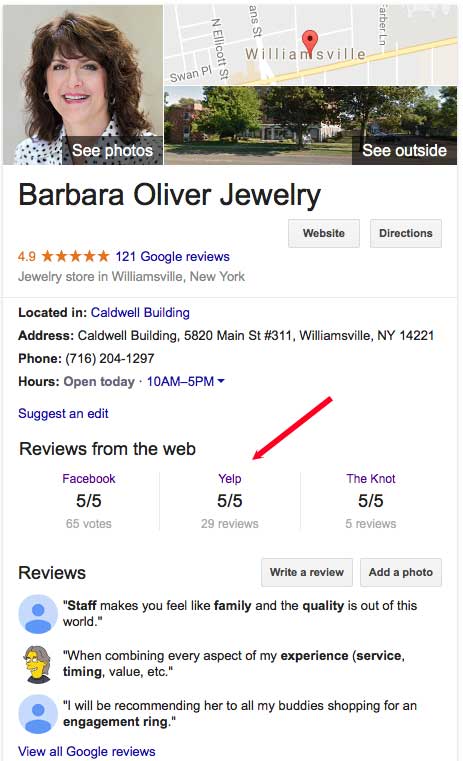
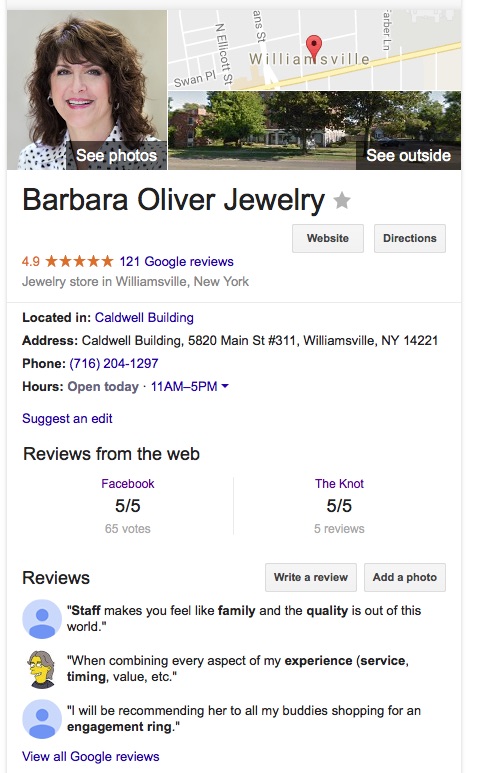
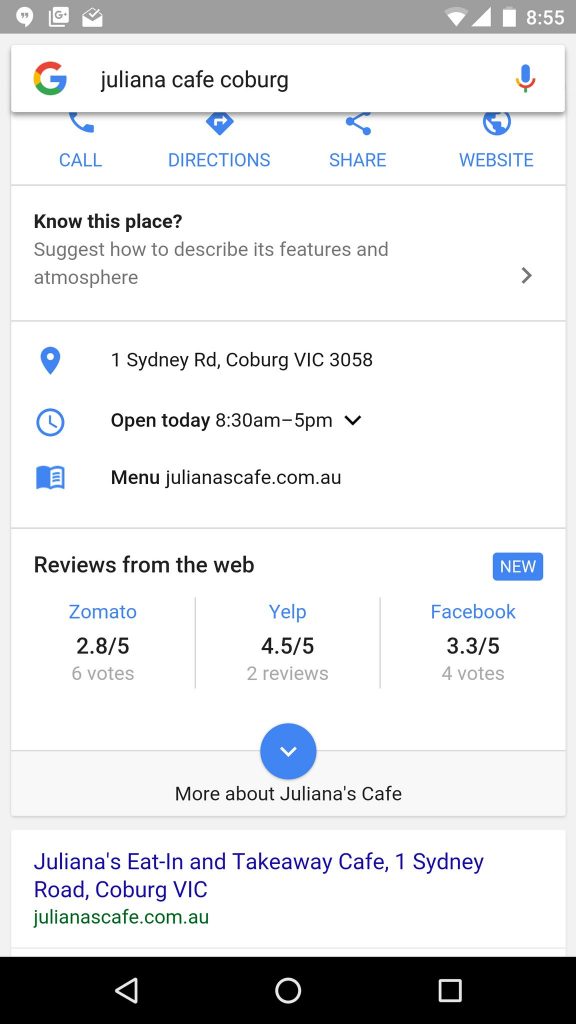
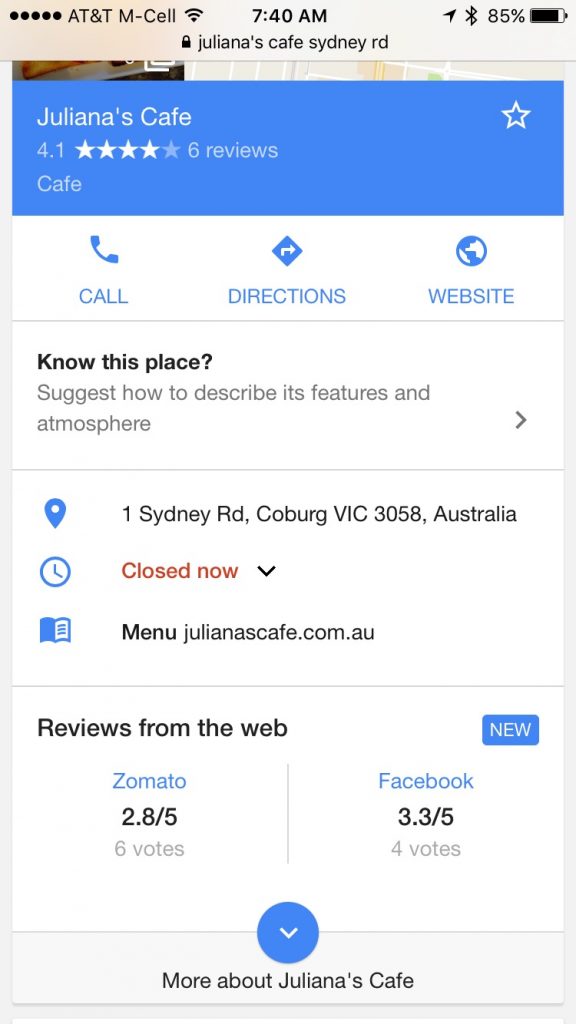
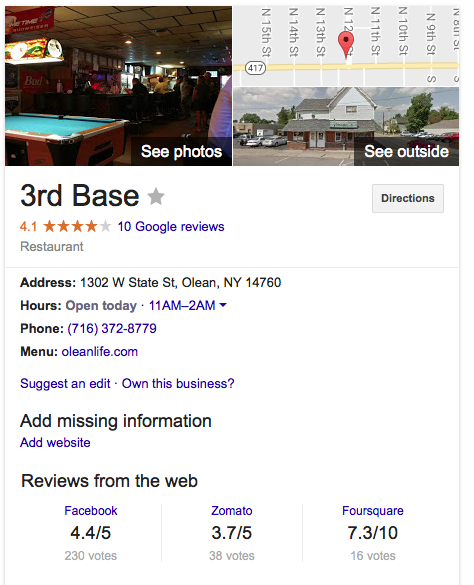
Comments
16 Comments
I don’t get why Yelp wouldn’t want their reviews there??
That’s a good question.
I think that Stoppleman sees the Knowledge Panel as the ultimate trojan horse. He sees it as a way for Google to capture traffic and retain traffic that is “rightfully” his.
The answer also seems imbued with a long history of antagonism and resentments as well. He clearly feels that Google is stealing his content.
Google has shown Yelp reviews in the distant past (2010) but he insisted that they be taken down.
Unfortunately he couches his arguments in terms of consumer benefits and from where I sit his arguments reek of self interest.
That being said, I do see Google’s plan as creating an environment where users of local get direct answers and if they need more will stick around Google to find the answers. Organic search has become a sort of lost leader to get users to spend more time at Google so that they ultimately click on more ads.
If those trends continue then Yelp’s primary source of new customers is lost.
Google acts anticompetitively in many fields of endeavor, and this is no exception. Like or hate Stoppelman, companies like TripAdvisor and Yelp actually care deeply about review content, reviewers, and their relationships with reviewed businesses. Google’s offering in this space is, quite simply, junk. And yet they’re going to push into it because they can. Doesn’t feel right.
@Andrew
I think there is general agreement that Google is a monopoly particularly in Local Search.
The questions though has long been whether Google leverages that position to the detriment of other businesses or to the benefit of consumers. I would argue that its both.
I would also argue that Google, in viewing reviews as a data source not as a source for human wisdom handles and displays them differently, treats them differently. As a result the results are not necessarily junk…. at least from their POV.
Although if you are a market proponent (and this is Google’s argument as well), if the user finds it to be junk they are just one click away from going some place else.
No. Yelp and Trip do not care deeply about review content, reviewers and their relationship to businesses. Yelp and Trip care about the bottomline and those things are just a means to an end.
And reviews overall have become less and less useful as the number or reviews per business have gone up. At least Trip tries to use Facebook (or did) to show what your friends might think. But neither has invested in a ‘people like you’ feature that would make reviews more useful again. Or a trend over time or going up or going down type of metric.
So instead of actually building a better product they just want to whine about Google’s evolving product. You know, the company that essentially built these mega-companies by delivering FREE traffic to their door. Both these companies still get approximately 2/3rds of their traffic from organic search.
So Yelp doesn’t want a link in the Knowledge Panel and all the visibility that goes with it? Nice job cutting off your nose. The site and app are so poor that Yelp still relies on Google to reacquire users. Maybe the problem isn’t Google eh?
Because Google basically protects Yelp in search because they’ve been such a PITA.
https://www.google.com/search?q=haircut+concord+ca
If it weren’t for the local pack this would be a useless SERP. There’s no other site that consistently gets 4+ results on the first page. That’s reserved for Yelp. And tell me that the 7 Yelp results in that SERP are truly necessary.
The fact is, everyone knows Yelp but most people search instead of going to Yelp because … Yelp is meh. And Google’s been making sure that even though that experience is meh that they continue pushing traffic to Yelp through domain crowding.
If Google were to treat Yelp normally and give them just 1 or 2 results in a SERP we’d see just how quickly Yelp would squeal. The problem is the squeal would be at Google and not at their product team.
Sadly, by allowing Yelp this SERP bloat, it freezes out new local competitors who actually might do something innovative in the space.
Lastly, if Yelp doesn’t want that link in the Knowledge Graph that simply tells folks what the rating is, then shouldn’t Yelp remove their aggregate rating snippet on their results? I mean, you’re telling folks the rating there too so …
@Aj
Well said. Nobody EVER said that Yelp’s arguments were logically coherent and consistent (other than to serve their interests).
And point well taken on the stagnation of review innovation from Yelp and TA…. the last innovation attempt was actually Marissa Mayer with the Zagat system… not popular but clearly more informative.
Its a strange world and the symbiotic/parasitic relationships are truly bizarre.
SERP bloat?
I find this response to be knee-jerk, with a hand-picked SERP example used to prove your point.
Try a bunch of others — https://www.google.com/webhp?sourceid=chrome-instant&ion=1&espv=2&ie=UTF-8#q=middle%20eastern%20restaurants%20philadelphia%20pa — and maybe a picture fairer to Yelp emerges. Are we here to be fair or to just hear ourselves talk?
1. Google doesn’t and shouldn’t curate the results; how is it, exactly, that they “allow” Yelp & TripAdvisor to flood the SERP’s? Users are looking for the richest content, presumably. In most “company related” review verticals, there are only a tiny handful of valuable pages in the universe available to rank. Everything else is just empty, scraped pages. Google’s tech does a remarkably good job of judging the richness of a page of this kind of content, and users’ degree of engagement with it. TA had multiple entries on many travel related queries dating way back to their early days. You know what, though? Those pages were what users were looking for. They had it. On a broad brush stroke view of it, with obvious exceptions, they deserved their rankings.
2. Yelp and TripAdvisor show up often in these areas and it’s just too easy to say they’re “meh.” Objectively, they have much more content, they work constantly to weed out bad reviews and fake reviews, they have rich user systems with persistent, identifiable users. But ideas are easy (the features you suggest, for example — everyone is a critic of review sites, I agree they aren’t what they should be, but try making a better one — in a financially viable way — not a walk in the park). Execution is hard. They’ve executed in terms of getting millions of users to willingly contribute some useful content. We’re in the early days of the usefulness of reviews, of course. And of course, monopolies like Facebook and Google should ideally be much better at helping us find like-minded advice; the more universal, networked, and privacy-violating an entity is, the more likely it is that they’ll be able to give us what we want in terms of filtering, etc., eventually. So scale matters. (So I shudder to think how these “local upstarts” who are somehow more scrappy and genuine than Yelp and TripAdvisor are going to come off as anything less than mickey-mouse by comparison with — not Yelp and TripAdvisor — but the powerful user bases of Microsoft, Google, Apple, Facebook, and Amazon.)
3. Click on any old random result vying for the same amount of attention in the SERP and you see something like: http://philadelphia.menupages.com/restaurants/sahara-grill/ . No confidence in these reviews. A perfunctory, off-the-shelf commenting system, with anonymous, one-off reviews.
4. This issue of Google sending “free traffic” to these websites. It sounds like you’re suggesting they engage in anticompetitive behavior if they’re displeased with them. Google sends free traffic to sites that have quality content — always have, always will. It’s what they do. Google ranks content, people look at it — and Google makes more money than anyone else as they do it. As Mike agreed, it is a sort of monopoly. So why would we suggest that it should also be a capricious one and specifically target some competitors because they “whine”?
5. I think you’d have to look high and low to find anyone praising the Zagat acquisition by Mayer. First, it was an attempt to prove herself in this role before eventually leaving Google, and the integration didn’t go well, so it wasn’t good for consumers. It was also a handy way to use Google’s deep pockets to knock a perfectly good independent player out of commission. Legal, maybe, but also anticompetitive and monopolistic.
I Googled “savvy zagat acquisition by Google,” and I wasn’t able to find anything about that, but I did find this:
http://www.forbes.com/sites/chrisbarth/2011/10/27/google-paid-151-million-to-get-zagat-ditch-yelp/#b945e4840754
Recall that Google reportedly pressured Yelp to sell out for $500 million “or else.” Yelp was told by many they’d be crazy not to take the deal. They’re worth $2.8 billion today, despite taking a lot of slings and arrows.
6. I just don’t understand the animus towards Yelp and TripAdvisor. The odds they had to fight against in order to not only grow tiny startups to a decent size, but take them public *and then silence the doubters that they would ever be truly viable financially*, were considerable. Many believed they had to IPO just to buy them breathing room against anticompetitive threats to Google. Many other small media companies are going to be trying to make a go of it, similarly. Why not imagine what life were like if you gave them a break, rather than just siding with the monopolist?
7. Microsoft used to argue regularly that its anticompetitive behavior is “better for consumers.” That’s what all monopolists say. It’s a fairly subjective argument. What I do know is that the power Google has over companies’ visibility — and the power Google has to use content providers’ content to bolster its own products — is a one-sided type of power. Do Stoppelman’s actions really surprise you, in light of that? Why do you turn on this individual, rather than taking shots at individuals in power at larger monopolists? I’m going to guess that you really don’t have much to lose taking potshots at Stoppelman (he’s not that big of a deal), and by doing so it puts you in a good light with the more powerful, virtually all-powerful monopolist. Hey, I love Google too. I just don’t see what’s so terrible about Yelp and TripAdvisor that they must face this constant barrage of unfair criticism. They’ve done well. My hat is off to them.
I am not sure whether you are directing your comments to me or AJ. I don’t particularly own any animus but I do find Yelp worthy of significant criticism.
As a small business person:
1- They prey on small business people with a deceptive pitch and have a long history of having done so.
2- Their ad product is very value and high cost both in absolute and relative to others in the industry and for the most SMBs there is a very low ROI….
3- But the SMBs, not having good analytic tool, do not realize it until it is too late and the analytic tools that Yelp does provide do not come anywhere near providing a full picture.
As an industry observer:
4- They whine an awful lot
5- Their arguments against Google are two faced. On the hand they are proclaiming that they are protecting the consumer all the while they are arguing their self interest
6- They consistently portray their growth and income optimistically and have yet to earn any money… up to this point they have invested $1 in expense to gain a $1 in sales and then proceed to tell everyone how great it is that they have a gazillion reviews.
7- Their business model is an intrinsic conflict of interest… selling SMBs who don’t want to be reviewed on the benefits of placing an expensive ad against the UGC..
As a consumer:
8- Their user experience when coming from Google or any place on the web is atrocious. When you do a search and go to their site.. you see a totally baffling interstitial…
9- They then want you to load their app which I already have but they take me to the App store and when I click open end up who knows where in Yelp
As an industry observer
10- If I have the audacity to point this out and note their obvious hypocrisy I am told by Mr Stoppleman to delete my account. Did I mention that he’s a whiner?
We live under capitalism… monopoly is part of that bargain. Yelp seems to think that if they complain enough it will somehow magically change and that there will be a ground swell of social and political support for their “idealistic” position. I say to them start talking truthfully, arguing more cogently, offering better value, treat SMBs better and I will find a lot less to criticize.
@Andrew
Part 2 in direct response to your points:
Some other thoughts:
1. Google doesn’t and shouldn’t curate the results
Essentially a search engine is a human curated endeavor. There are values and assumptions built into the algo that reflects the beliefs of the programmers. This is normal and necessary even if unstated. Yelp seems to contend that old curation is better than the new curation. But do so only when they are impacted. BS argument.
2. Yelp and TripAdvisor show up often in these areas and it’s just too easy to say they’re “meh.” Objectively, they have much more content,
I have seen enough examples of Yelp’s SEO good, bad and incredible to know that they have manipulated search results (they purchased for example a ton of Yahoo links in days gone by) in response to Google’s changing algo. There is enough perfidy to go around and Yelp is not innocent.
3. Click on any old random result vying for the same amount of attention in the SERP
This is a hard discussion to have anecdotally but I agree with AJ on this one, Yelp and TA often dominate local results. Is it because of Google curation or because they adapt very smartly to the changing curation rules I am not sure. But I would agree with AJ on that one.
5. I think you’d have to look high and low to find anyone praising the Zagat acquisition by Mayer.
Your selective search is not a way to prove or disprove my point that the Zagat review system was an attempt to improve the value of reviews. It’s a straw man argument. I was not talking about the acquisition I was talking about the increased granularity of the information and the increased value of the review as a result. It was an “innovation” and unfortunately Google did not have the “courage” to refine it or to implement. I think if done with some care it could have proven a great boon to the understanding we can gather individually or collecting from review content.
6. I just don’t understand the animus towards Yelp
See my response above
7. Do Stoppelman’s actions really surprise you, in light of that? [in light of Google’s monopolistic behaviors]
From both a tactical and strategic viewpoint his behaviors, whining and bitching in a self serving way hurt his case. Contrast the behaviors of TripAdvisor and Yelp. Both have made their case but Stoppleman does so in a way that ends up undercutting his position. The boy who cried wolf comes to mind. Or perhaps the “bro” at an elite university, driving a Porsche and acting out. Or maybe the “bro” who cried wolf might be the best analogy.
I am a business owner who Yelp has attempted their extortion like sales pitch on. I would never use yelp, I would not pay them a dime of my hard earned money either. https://www.youtube.com/watch?v=l2dkJctUDIs
Ultimately what is lost in all this fault-finding is the important role online reviews play in protecting consumers and in providing a platform for free speech and exchange of information — especially about businesses who fall short, cheat customers, claim quality when quality is lacking, etc.
We are not that far removed from the days of some small businesses (be they restaurants, inns, retailers, or kitchen contractors) routinely bullying and cheating customers, and where one’s only recourse was to seek legal/state protections. The splendid isolation and control tactics enjoyed by some bad actors is gone, of course. They hate that.
Because platforms like Yelp and TA (and Angie’s List — as for your financial benchmarks, this company has received state subsidies, local subsidies, and multiple rounds of investment to the tune of an accumulated defcit of hundreds of millions of dollars, and they have been trying to make a profit since the 1980’s!!) put bad business owners on the defensive, and a great many business owners aren’t comfortable reading feedback online, some of which may be fake or unfair, the response seems to be to shoot the messenger.
By attacking online review platforms willy-nilly and unfairly, we attack those gains that have been made by consumers. The numerous attempts to show manipulation and unfair sales practices have been examined in exhaustive depth by the FTC, and they found no evidence of wrongdoing. When will this case finally be closed?
Clearly, all monetization/advertising models involve some compromise. All business owners want “free, organic love.” So when it comes to whining, that’s who’s often doing the whining. Business owners who believe advertising and promotion and taking care of their online reputations should be their right — at no cost. These should be their right, but they come with a cost.
Google faced all these same criticisms, and many headlines, in the past, from beleaguered business owners dissatisfied with their organic rank. I guess everyone gave up on that line of argument since they finally realized Google is a for-profit business and it isn’t looking for the small business community’s approval.
I have no comment on interstitials and things of that nature. If they are bad enough, usage will decline and/or the publisher who uses them will find their presence in search engines declining based on the overall score they deserve to receive by a complex ranking algorithm. Stupid is as stupid does.
Based on Yelp’s growth and overall size, I have to wonder whether all the nitpicking about the user experience may be subjective and overdone. Like someone on this thread mentioned, if a user dislikes the experience, another experience is just a click away.
Your view of Stoppelman as a “bro who drives a Porsche and acts out” suggest you maintain cultural standards of people when they’re involved in a debate of substance. I’m sure if we examined the whining, jet-owning, philandering nature of numerous individuals at other companies you seem to prefer to Yelp, we could find much to criticize. At the end of the day, they all work on important products that tend to delight millions of users — that’s why they get paid so much, and that’s why public admiration (or at the very least, grudging respect) tends to outflank probably deserved scorn. See: Steve Jobs, Elon Musk, Mark Zuckerberg.
The fact that Yelp and TA achieve many strong rankings today has little to do with machinations to rank in the main SERP listings (aka the old ten blue links). The scale of their content and the scale of what Google does with its algorithm are beyond the scope of petty scheming, IMO. I remember being told (several years ago) that for a short time, SEOmoz was consulting with Yelp to help them improve their SEO via site architecture and other detail. It didn’t looked like it either helped, or hurt; it may nor may not have been useful as an exercise in taxonomy, but it’s been overwritten numerous times. And really, “buying Yahoo links” way back when? Surely that’s irrelevant. Google doesn’t keep ranking sites if they’ve been engaged in manipulation or if signals they’ve won cannot stand up to scrutiny. Seems like at this point we are just piling on. The rankings these companies currently have, in my opinion, are fair and deserved based on their merits.
Andrew
I am somewhat disappointed that you did not address some of my substantive criticism of Yelp directly.
I am not attacking reviews or review companies willy nilly. I have and always have had a great involvement with reviews and review companies. And an appreciation for their value and have long strived to help SMBs cope.
But my criticism of Yelp is largely around their other behaviors… note not one word in my critique of their handling of reviews.
Mike has done a good job of documenting why many businesses have an animus toward Yelp so I won’t belabor that. Instead I’ll address the remaining points.
It’s hard for me to think Google isn’t doing something to ensure Yelp receives a more than equitable amount of SERP space. The example I used is the tip of the iceberg. But there are plenty more.
https://www.evernote.com/shard/s242/sh/b518dd64-02fe-4d11-b185-42d0d41d7c71/017f9f7ef220d8d855445dee43345219
The first four results. And is there any reason to have both the first and second result since they’re essentially duplicative?
https://www.evernote.com/shard/s242/sh/87afd1e1-1e33-40ed-ad86-36e27c6c3bb5/6aa9e539c5acecc8762a5cadfb84f5cd
The first three results again.
https://www.evernote.com/shard/s242/sh/6001c8c5-3889-4b09-b2d0-9bdb0ad370e1/7cdcd7432f1fe20ccab16026ab5abc15
The first three results again.
https://www.evernote.com/shard/s242/sh/13ad9c54-5451-42ca-aae5-9f186552aee7/c2c4a75728653193bbad6e137a110547
Five results in all.
https://www.evernote.com/shard/s242/sh/ca23c018-da32-4c94-bfb3-a9a867f29f22/46efc908b6c5099010afa4d1265cd55d
The first three results.
I’m not saying that Yelp doesn’t deserve a spot at or near the top. But I’m flummoxed by the host crowding Yelp achieves. I think most people know Yelp. So if they see it in a SERP they can go and use the site to understand Yelp’s perspective on things. And if their brand is so epic then why exactly do people not just go directly to Yelp? Think about that.
At most Yelp should get a category and a listing result. Two category results is simply … duplicative with the alternate page a simple SEO ploy to achieve more SERP space.
I don’t like it but I can appreciate what they’ve done and achieved. But they’re really getting away with quite a bit. So with this in mind the endless whining about how unfair the ecosystem is … rings really false for me. This isn’t about protecting users. I mean, look at those two category pages! It’s about protecting their stock price.
And there are plenty of start-ups that could get to scale and challenge folks like Yelp and TripAdvisor. I mean, if Foursquare had passable SEO they’d have been right there and made a good play for it. But it’s harder when you know Yelp is going to soak up 2-5 of the spots on the first page.
TripAdvisor simply buys anyone who starts to challenge them. Many times they buy, then syndicate and do some resorting to obscure the fact that the content is the same so they can have multiple web properties (with the same listings) rank for important terms.
I wrote about this earlier this year.
http://www.blindfiveyearold.com/acquisition-seo-and-business-crowding
And again, if that’s what works and what Google is going to allow then good on them. But then to get grumpy when Google does anything that reduces their organic traffic is … disappointing to say the least.
TripAdvisor is part of Fairsearch (http://fairsearch.org/about/), which is essentially an organization meant to antagonize Google. Yelp doesn’t seem to be a member but they align with them and are actively looking for ways to make Google’s life miserable.
Don’t get me wrong. There are some Google abuses – some that haven’t even come to light yet – that make my blood boil. But most of the stuff put out by Fairsearch and the rants by Stoppelman are either completely specious or very weak.
My ‘shots’ as you call them are delivered based on my analysis of each situation. When Google is wrong (as they often are on paid search) then I’ll call out Google. But when the situation shows the opposite I’ll call out those making specious claims.
Personally, I think Google mistreats SMBs via their AdWords product. It’s set-up to essentially burn through the money of unsuspecting small business owners. And Google doesn’t care because they feel like it’s a renewable resource – the old businesses fail and new businesses are created and fill that vacuum. So let’s be clear, my ‘side’ is not pre-determined based on classifying one a ‘monopolist’ and the other an ‘entrepreneur’.
The Zagat acquisition was a failure. Part of the reason was that Google has never been all that good at local and they botched it. But the other reason is likely that folks like Yelp were burning up the phone lines at the DOJ and harassing Google as they worked to integrate the new property and reviews.
At some point the decision might have been made to simply punt on it because it wasn’t worth the hassle. The obstructionist tactics by Yelp may have helped put Zagat 6 feet under. But again, given this, who in the ecosystem is hamstringing innovation exactly? And are we saying that Google can’t ever build a competing product? Should they have been prevented from developing Chrome? Or Android? Or having the Play store?
Both TripAdvisor and Yelp play the search game very hard. They’ve essentially used every loophole available to consolidate their position and build their brand. Google too is a very savvy and hard driving business. “Don’t be evil” doesn’t mean, “Don’t play hardball in business”.
So Trip and Yelp can continue to follow the obstructionist path in an effort to slow Google’s evolution. But the users will ultimately make the final choice, which means both companies would be better off focusing on building a better product instead of playing defense with Google.
Reviews are not exactly a silver bullet, are they?
Here we are in 2014.
http://www.cnbc.com/2014/12/23/tripadvisor-fined-600000-for-fake-reviews.html
But everything was cleaned up right?
http://www.dailymail.co.uk/news/article-3276617/Disturbing-proof-online-review-book-holiday-FAKE-Investigation-reveals-entire-industry-dedicated-generating-bogus-appraisals-cash.html
Maybe not.
Yelp has been slightly better at stopping fake reviews since a 2013 analysis showed a large percentage of reviews might be fake.
http://www.eater.com/2013/9/26/6364287/16-of-yelp-restaurant-reviews-are-fake-study-says
Since then Yelp was sued regarding reviews but ultimately won. But clearly the scrutiny they received was a major impetus for cracking down on fake reviews. Their filter is now pretty aggressive, so much so that it often tars legitimate reviews.
And clearly the practice still exists.
https://www.reddit.com/r/casualiama/comments/4dwkse/i_write_fake_reviews_for_yelp_and_other_service/
I present all of this for context.
But why exactly should we laud these platforms for being a ‘white knight’ for consumers? Have they provided value? Yes. But just how much and how vigilantly they ensure the right information is presented is less clear.
And as for growth, Yelp traffic hasn’t really gone anywhere for the last two years as far as I can tell using third-party tools and news reports. So if that’s your proxy for satisfaction then …
I also noticed this change too. Google might be trying to force Yelp into something but you never know. Thanks!
@Andre or perhaps Yelp is trying to force Google. Who knows?
Comments for this post are closed.